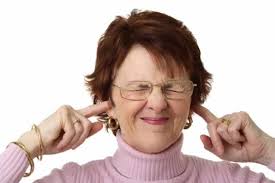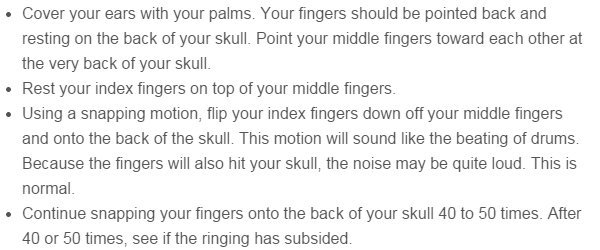It isn’t uncommon to have some ringing in your ears once in a while. It may often sound like a dull hum, buzz, or a high pitched whine. It may happen off and on for only minutes at a time. If you have this condition and want to know, what does it mean when your ears ring, this article will help you understand it better. The condition is medically known as, tinnitus. It is a common condition in people of any age, but more common in people over the age of 40. Both men and women experience it, but it can be more common in men. Around 10 percent of the United States population get tinnitus for up to five minutes or longer every year.
What Does It Mean When Your Ears Ring?
 One folk answer to the question is that someone is talking about you! While these can be fun answers, ear ringing actually has a few different medical explanations. First, let’s look at the two types of ear ringing:
One folk answer to the question is that someone is talking about you! While these can be fun answers, ear ringing actually has a few different medical explanations. First, let’s look at the two types of ear ringing:
Pulsatile Tinnitus—Serious
This type of ear ringing may be caused by issues with the blood vessels in your neck, so see a doctor if you have it. Signs of Pulsatile tinnitus are ringing that sounds like your heartbeat or whooshing sounds in your ear.
Nonpulsatile Tinnitus—Benign
This type usually involves the hearing nerve. It is completely benign, but may be a nuisance. It is commonly caused by loss of hearing due to loud noises or aging. Signs of this type are buzzing, sound coming from inside your head, or high pitched whining.
Causes of Ear Ringing
- Earwax
- Weight loss
- Changes in barometric pressure
- Medications (Antibiotics, Aspirin, Blood Pressure, etc.)
- Too much caffeine
- Too much alcohol
- Hyperextension of the neck
- Thyroid conditions
- Whiplash (neck injury from forceful movement)
- Rupture of the eardrum
- Ear Infection
- TMJ (temporomandibular disease/jaw disease)
- Meniere’s disease
- Anemia
- Acoustic Neuroma (mass on the hearing nerve)
When Should I See a Doctor?
If you have tinnitus and don’t know what is causing it, see your doctor to get things checked out. It could be something as simple as an earwax plug. You still need to make sure there isn’t a medical issue that needs treatment or a medication adjusted. If you get the okay from your doctor that it isn’t an underlying health problem, your doctor may want you to see an ear, nose, and throat specialist to make sure you are not experiencing a problem in this area. If it is because of a loss of hearing, you may need to see an audiologist to check your hearing status.
How Is Ringing in The Ears Treated?
Besides learning “what does it mean when your ears ring”, you should also know what to do about it. Any medical causes of tinnitus are treated by taking care of the underlying medical condition or a medication change or adjustment. Non-health related causes can be treated with the following interventions:
1. Use White Noise Machines
This is a relatively inexpensive way to drown out the sound of ringing in the ears. You can use them in your bedroom or wherever you sit to relax. They make sounds like water, rain, the woods, or ocean waves. This is really helpful for some people and aids in restful sleep.
2. Reduce Exposure to Noise and Remove Earwax
Loud noises are often the cause of ringing in the ears. Loud noise damages the inner hair cells that help you hear. If you can keep your television and radio to a low volume, you will save your hearing and prevent ear ringing. Use earplugs if you are exposed to loud noise on a daily basis.
Also removing impacted earwax can decrease the ringing in ears and tinnitus symptoms.
3. Limit or Avoid Certain Things
- Quit drinking alcohol and drinks that contain caffeine.
- Nicotine can make ear ringing worse because it reduces blood flow to the structures of the ear, so it is advised to quit smoking as well as smokeless tobacco products.
- Limit use of aspirin, products that contain aspirin, as well as other nonsteroidal anti-inflammatory drugs (NSAIDs) such as naproxen or ibuprofen.
4. Exercise and Practice Relaxation Techniques
- Stress and fatigue can worsen tinnitus. Direct your attention to other things and practice relaxation techniques, such as meditation, biofeedback, or yoga.
- Exercise can improve blood flow to the structures of the ear. Try exercises like walking but avoid extended periods of exercise, which keep your neck in a hyperextended position such as bicycle riding.
- Do skull thumping
Wikihow also recommends doing the skull-thumping trick to relieve ear ringing from a loud concert or constant exposure from much noise. Here’s what to do:

5. Hearing Aid
If the doctor finds the cause is hearing loss in one or both ears, you may need a hearing aid that will help balance sounds so you can hear better. If your hearing improves, the ringing in your ears may get quieter or even stop. An audiologist can have the hearing aid made for you if they find a problem.
6. Sound Generators
White noise can drown out ringing in the ears. Sound generators fit inside the ear canal and make a soft noise so that you can’t hear the ringing. It is helpful to keep the noise just above the ear ringing sound. These usually play a soft whooshing sound, music, or certain tone that is comfortable for listening.
7. Cognitive Behavioral Therapy
A therapist can teach you tricks to help relieve the discomfort and learn to forget about the ear ringing. They teach you about the causes of ear ringing and help with ideas to reduce your focus on the noise. They can also teach relaxation techniques to help you sleep at night.
8. Cochlear Implant Devices
Cochlear implants help the auditory nerve work by bypassing the inner ear and sending an impulse to the nerve. It improves or restores hearing. This reduces ringing in the ears by taking over the job of stimulating the nerve. Some ear ringing is caused by the brain sending constant signals to try and trigger the nerve when there is damage.
9. Acoustic Nerve Stimulation
This is an outer device used to send a signal to the acoustic nerve via headphones. The signal comes with pleasant music that also helps ear ringing. It stimulates the neural circuits in the brain from the outside of the body, rather than an implant. Many people who are using the device are reporting success in getting rid of ringing in the ears.
10. Medications
Doctors don’t always like to prescribe medications for tinnitus, but if the above techniques are not effective a short term trial of the following may help:
- Antidepressants
Antidepressants may help if the cause is due to emotional stress. This can help moods and sleeping patterns, which may in turn reduce ear ringing.
- Antianxiety Medication
If the cause is anxiety, antianxiety medications may help relieve ear ringing but should only be used as needed on a temporary basis since some of these are habit forming.
